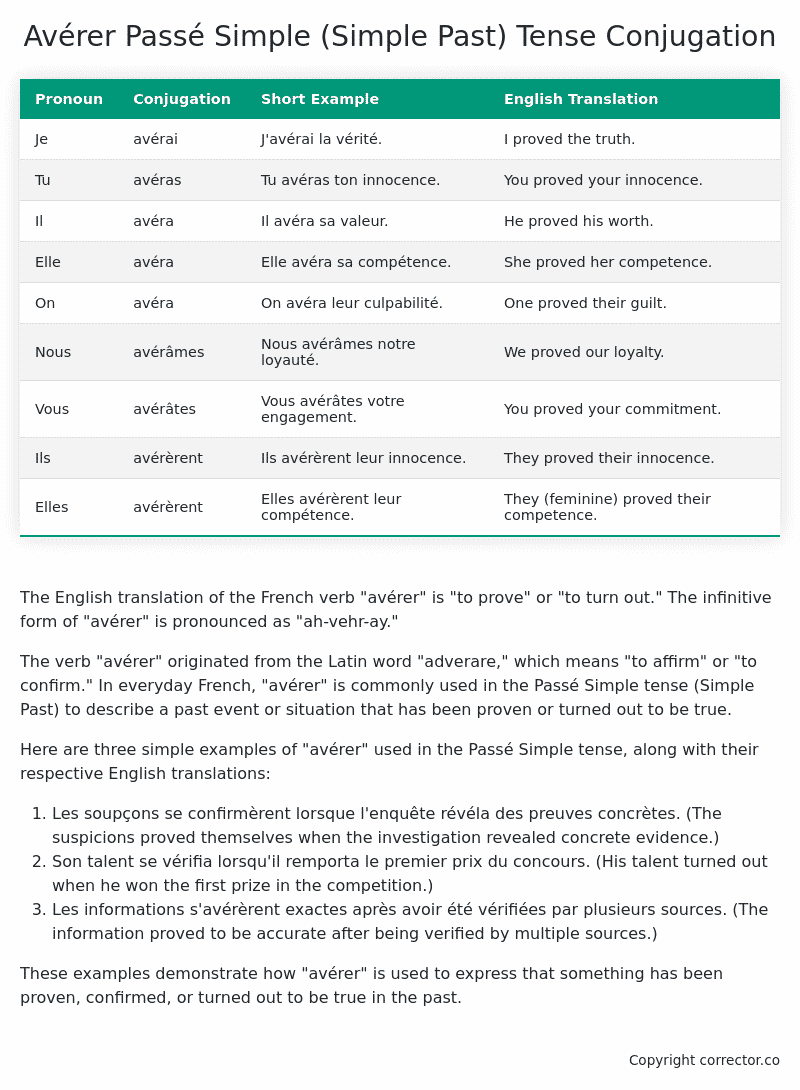Passé Simple (Simple Past) Tense Conjugation of the French Verb avérer
Introduction to the verb avérer
The English translation of the French verb “avérer” is “to prove” or “to turn out.” The infinitive form of “avérer” is pronounced as “ah-vehr-ay.”
The verb “avérer” originated from the Latin word “adverare,” which means “to affirm” or “to confirm.” In everyday French, “avérer” is commonly used in the Passé Simple tense (Simple Past) to describe a past event or situation that has been proven or turned out to be true.
Here are three simple examples of “avérer” used in the Passé Simple tense, along with their respective English translations:
- Les soupçons se confirmèrent lorsque l’enquête révéla des preuves concrètes. (The suspicions proved themselves when the investigation revealed concrete evidence.)
- Son talent se vérifia lorsqu’il remporta le premier prix du concours. (His talent turned out when he won the first prize in the competition.)
- Les informations s’avérèrent exactes après avoir été vérifiées par plusieurs sources. (The information proved to be accurate after being verified by multiple sources.)
These examples demonstrate how “avérer” is used to express that something has been proven, confirmed, or turned out to be true in the past.
Table of the Passé Simple (Simple Past) Tense Conjugation of avérer
| Pronoun | Conjugation | Short Example | English Translation |
|---|---|---|---|
| Je | avérai | J’avérai la vérité. | I proved the truth. |
| Tu | avéras | Tu avéras ton innocence. | You proved your innocence. |
| Il | avéra | Il avéra sa valeur. | He proved his worth. |
| Elle | avéra | Elle avéra sa compétence. | She proved her competence. |
| On | avéra | On avéra leur culpabilité. | One proved their guilt. |
| Nous | avérâmes | Nous avérâmes notre loyauté. | We proved our loyalty. |
| Vous | avérâtes | Vous avérâtes votre engagement. | You proved your commitment. |
| Ils | avérèrent | Ils avérèrent leur innocence. | They proved their innocence. |
| Elles | avérèrent | Elles avérèrent leur compétence. | They (feminine) proved their competence. |
Other Conjugations for Avérer.
Le Present (Present Tense) Conjugation of the French Verb avérer
Imparfait (Imperfect) Tense Conjugation of the French Verb avérer
Passé Simple (Simple Past) Tense Conjugation of the French Verb avérer (You’re reading it right now!)
Passé Composé (Present Perfect) Tense Conjugation of the French Verb avérer
Futur Simple (Simple Future) Tense Conjugation of the French Verb avérer
Futur Proche (Near Future) Tense Conjugation of the French Verb avérer
Plus-que-parfait (Pluperfect) Tense Conjugation of the French Verb avérer
Passé Antérieur (Past Anterior) Tense Conjugation of the French Verb avérer
Futur Antérieur (Future Anterior) Tense Conjugation of the French Verb avérer
Subjonctif Présent (Subjunctive Present) Tense Conjugation of the French Verb avérer
Subjonctif Passé (Subjunctive Past) Tense Conjugation of the French Verb avérer
Subjonctif Imparfait (Subjunctive Imperfect) Tense Conjugation of the French Verb avérer
Subjonctif Plus-que-parfait (Subjunctive Pluperfect) Tense Conjugation of the French Verb avérer
Conditionnel Présent (Conditional Present) Tense Conjugation of the French Verb avérer
Conditionnel Passé (Conditional Past) Tense Conjugation of the French Verb avérer
Conditionnel Passé II (Conditional Past II) Tense Conjugation of the French Verb avérer
L’impératif Présent (Imperative Present) Tense Conjugation of the French Verb avérer
L’impératif Passé (Imperative Past) Tense Conjugation of the French Verb avérer
L’infinitif Présent (Infinitive Present) Tense Conjugation of the French Verb avérer
L’infinitif Passé (Infinitive Past) Tense Conjugation of the French Verb avérer
Le Participe Présent (Present Participle) Tense Conjugation of the French Verb avérer
Le Participe Passé (Past Participle) Tense Conjugation of the French Verb avérer
Struggling with French verbs or the language in general? Why not use our free French Grammar Checker – no registration required!
Get a FREE Download Study Sheet of this Conjugation 🔥
Simply right click the image below, click “save image” and get your free reference for the avérer Passé Simple tense conjugation!

Avérer – About the French Passé Simple (Simple Past) Tense
Formation
Usage
Narration
Historical Context
Interactions with other tenses
Passé Composé
Imparfait
Conditional and Subjunctive
Summary
I hope you enjoyed this article on the verb avérer. Still in a learning mood? Check out another TOTALLY random French verb conjugation!


